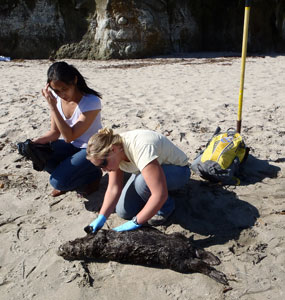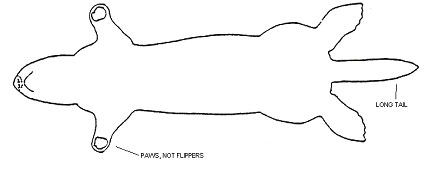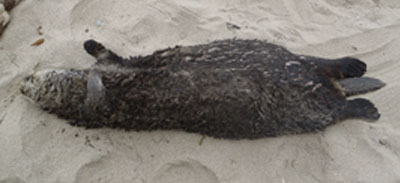 An immature stranded sea otter being examined by CDFW scientists at the beach.
An immature stranded sea otter being examined by CDFW scientists at the beach.

 An illustration and photo depicting the specific external characteristics of sea otters.
An illustration and photo depicting the specific external characteristics of sea otters.
CDFW initiated sea otter population studies in 1968 in response to State Senate Concurrent Resolution 74. A key component of these studies has been documenting mortality of southern sea otters and, when possible, determining the cause of death. This information informs our understanding of sea otter population dynamics and best achievable care for oiled sea otters.
Response to stranded southern sea otters (dead animals and live animals in distress) occurs through a network of collaborators. Biologists from CDFW, the Monterey Bay Aquarium (MBA), The Marine Mammal Center (TMMC), Channel Islands Marine and Wildlife Institute, the US Geological Survey (USGS), the California Academy of Sciences, and other members of the California Marine Mammal Stranding Network all contribute to the collection of stranded sea otters in California. CDFW sea otter biologists also assist these partner agencies during stranding events involving other species including cetaceans, pinnipeds, seabirds, and sea turtles. The CDFW, MBA, and TMMC are the primary response organizations for live stranded sea otters; sea otter treatment and rehabilitation is conducted by MBA and TMMC. Necropsies are conducted by CDFW and TMMC. When responding to a dead stranded sea otter, biologists may collect the animal for a detailed examination at a laboratory facility or may perform a necropsy in the field. We assess the age, sex, decomposition level, nutritional condition, and other internal and external characteristics.
Sea Otter Stranding Data
Annual southern sea otter stranding reports and stranding data for 2019 and onward(opens in new tab)
Excel files from the resource linked above include a tab with metadata explaining the data fields. Please read the metadata carefully to understand the scope and limitations of these data. Note that cause of stranding category assignment is based on assessment at gross necropsy and may subsequently change after histology is examined. In many cases animals have multiple factors that contribute to the cause of stranding; here only the primary cause of stranding category, as determined during the gross necropsy, is reported.
Users of this dataset should contact CDFW (see contact information below) if they have any questions or prior to any use of these data in scientific studies or publications. Information on causes of mortality from detailed necropsies conducted by CDFW can be found on our Sea Otter Necropsy Program page. Stranding data prior to 2019 is available through USGS(opens in new tab).
Report Stranded Sea Otters
Please report any stranded sea otters (dead animals or live animals in distress) promptly. Note that characteristics distinguishing sea otters from other marine mammals include dark shaggy fur, paws (not flippers) on the forelimbs, and a tail that extends to or beyond the hind flippers. Please provide detailed location information and a photo, if possible and safe to acquire (don’t get too close to live animals). Photos of the animal with landmarks in the background are helpful. GPS coordinates or detailed location information will facilitate a swifter response.
Live Sea Otters in distress
- Santa Cruz County and north: The Marine Mammal Center (415) 289-7325
- Monterey County: Monterey Bay Aquarium Security Office (831) 648-4840
- San Luis Obispo County and south: The Marine Mammal Center (415) 289-7325
Dead sea otters
- Santa Cruz County and north: CDFW Stranded Sea Otter Hotline (831) 687-8776 (can receive text messages and photos)
- Monterey County.: Monterey Bay Aquarium Security Office (831) 648-4840
- San Luis Obispo County and south: CDFW, Mike Harris (831) 212-7090 (can receive text messages and photos)
Oiled wildlife
- Statewide: Oiled Wildlife Care Network: 1 (877) 823-6926